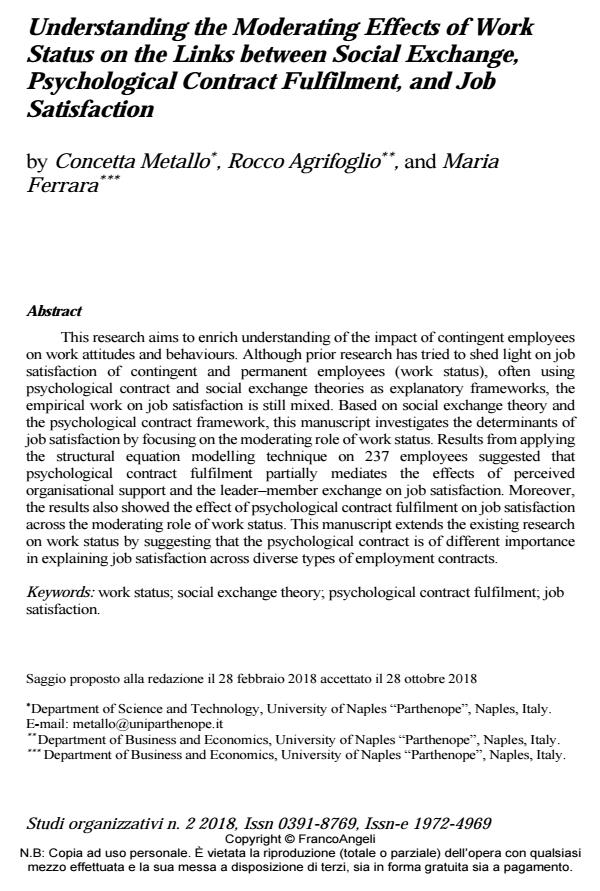Understanding the Moderating Effects of Work Status on the Links between Social Exchange, Psychological Contract Fulfilment, and Job Satisfaction
Titolo Rivista STUDI ORGANIZZATIVI
Autori/Curatori Concetta Metallo, Rocco Agrifoglio, Maria Ferrara
Anno di pubblicazione 2019 Fascicolo 2018/2
Lingua Inglese Numero pagine 26 P. 88-113 Dimensione file 342 KB
DOI 10.3280/SO2018-002004
Il DOI è il codice a barre della proprietà intellettuale: per saperne di più
clicca qui
Qui sotto puoi vedere in anteprima la prima pagina di questo articolo.
Se questo articolo ti interessa, lo puoi acquistare (e scaricare in formato pdf) seguendo le facili indicazioni per acquistare il download credit. Acquista Download Credits per scaricare questo Articolo in formato PDF

FrancoAngeli è membro della Publishers International Linking Association, Inc (PILA), associazione indipendente e non profit per facilitare (attraverso i servizi tecnologici implementati da CrossRef.org) l’accesso degli studiosi ai contenuti digitali nelle pubblicazioni professionali e scientifiche.
This research aims to enrich understanding of the impact of contingent employees on work attitudes and behaviours. Although prior research has tried to shed light on job satisfaction of contingent and permanent employees (work status), often using psychological contract and social exchange theories as explanatory frameworks, the empirical work on job satisfaction is still mixed. Based on social exchange theory and the psychological contract framework, this manuscript investigates the determinants of job satisfaction by focusing on the moderating role of work status. Results from applying the structural equation modelling technique on 237 employees suggested that psychological contract fulfilment partially mediates the effects of perceived organisational support and the leader-member exchange on job satisfaction. Moreover, the results also showed the effect of psychological contract fulfilment on job satisfaction across the moderating role of work status. This manuscript extends the existing research on work status by suggesting that the psychological contract is of different importance in explaining job satisfaction across diverse types of employment contracts.
Questo studio ha lo scopo di analizzare come lo status di lavoratore flessibile possa influenzare le attitudini ed i comportamenti organizzativi. Nonostante le numerose ricerche condotte sul tema della soddisfazione lavorativa dei lavoratori flessibili, i risultati empirici generati sono ancora contrastanti. Attraverso la lente interpretativa della teoria dello scambio sociale e il framework del contratto psicologico, questa ricerca indaga le determinanti della soddisfazione sul lavoro focalizzandosi sul ruolo di moderatore dello status lavorativo. E’ stata condotta un’indagine di tipo quantitativo intervistando 237 lavoratori. I risultati hanno evidenziato che la relazione tra determinanti (supporto organizzativo percepito e scambio sociale con il leader) e soddisfazione lavorativa è parzialmente mediata dall’adempimento del contratto psicologico. Inoltre, i risultati hanno anche mostrato l’effetto dell’adempimento del contratto psicologico sulla soddisfazione lavorativa attraverso il ruolo moderatore dello status lavorativo. Questo studio estende la ricerca esistente sullo status lavorativo, suggerendo che il contratto psicologico ha un’importanza diversa nello spiegare la soddisfazione lavorativa per le diverse tipologie di contratti di lavoro.
Parole chiave:Status lavorativo; social exchange theory; contratto psicologico; soddisfazione lavorativa.
Concetta Metallo, Rocco Agrifoglio, Maria Ferrara, Understanding the Moderating Effects of Work Status on the Links between Social Exchange, Psychological Contract Fulfilment, and Job Satisfaction in "STUDI ORGANIZZATIVI " 2/2018, pp 88-113, DOI: 10.3280/SO2018-002004